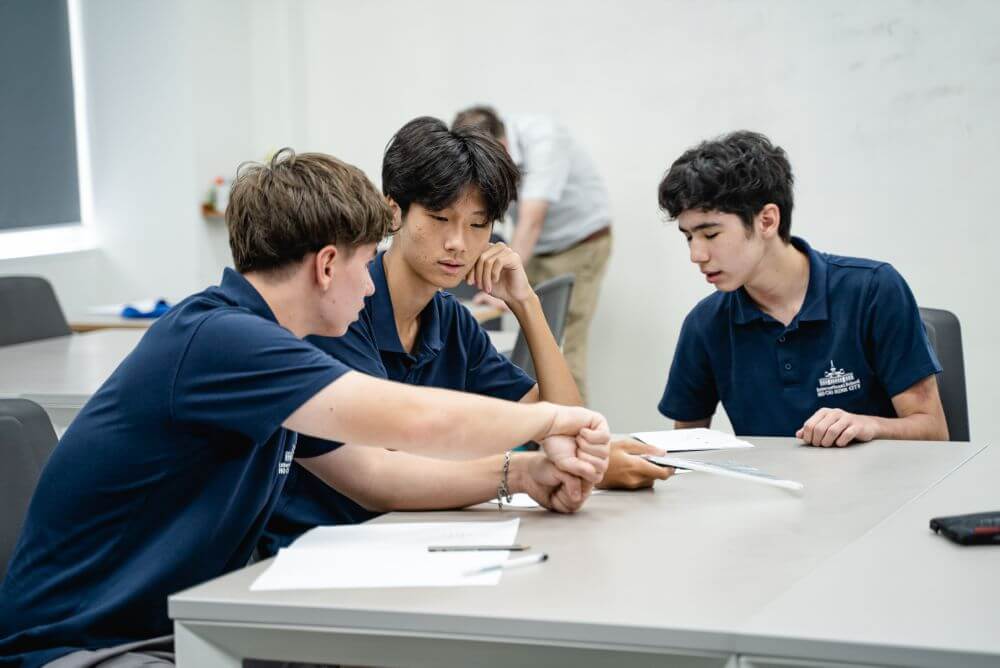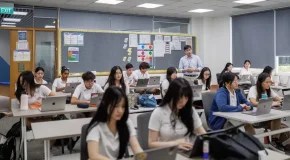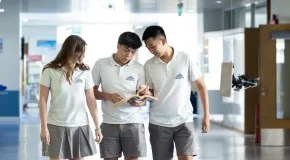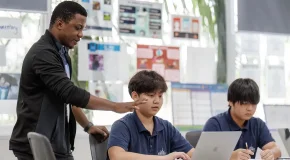How Does School Affect Students?
- How Does School Affect Students?
- Don't miss out - reserve your spot today!
- Good Schools Can Foster Academic Growth
- International Baccalaureate (IB) Programme
- Apply Inquiry-based Learning Method
- Good Schools Can Help Your Child Improve Their Social Interaction Skills
- 1. Collaboration Skills
- 2. Communication Skills
- 3. Critical Thinking Skills
- 4. Creative Thinking Skills
- 5. Transferring Skills
- 6. Research Skills (Media literacy and Information literacy)
- 7. Affective Skills (Empathy, Self-motivation, Self-esteem, etc.)
- 8. Organizational Skills
- 9. Reflective Skills
- Good Schools Can Promote Physical Development Skills
- Wrapping Up!
- FAQs
“How does school affect students?” This article reveals that beyond homework and grades, schools are critical in developing children into smart, caring, and strong individuals. Good schools significantly shape children in positive ways, influencing their well-being and development across various dimensions.
Don't miss out - reserve your spot today!
To register for “IB PYP Math with ISHCMC Students”, please fill in the form below.
"*" indicates required fields
Good Schools Can Foster Academic Growth
Good schools provide a supportive learning environment, access to quality resources, skilled teachers, and, most importantly, a comprehensive program for students. This can be exemplified by the International Baccalaureate (IB) Programme – one of the best programs for students’ academic growth.
International Baccalaureate (IB) Programme
The International Baccalaureate (IB) Programme shows our dedication to giving students a full and exciting education. It helps grow their curiosity, thinking skills, and understanding of the world, preparing them to explore different subjects and learn important skills for school.
The IB Programme helps children develop:
- Critical thinking skills: By tackling challenging coursework and engaging in inquiry-based learning, students learn to dissect information critically, evaluate arguments, and construct well-grounded conclusions.
- Communication skills: The IB curriculum emphasizes effective communication, whether through written compositions, oral presentations, or visual media. This emphasis empowers students to articulate their thoughts cogently and persuasively.
- Research skills: Encouraging independent inquiry, the IB Programme nurtures students’ ability to conduct research, sift through information, and synthesize diverse sources, thereby fostering information literacy and academic integrity.
- Global awareness: With an international outlook embedded within its framework, the IB Programme encourages students to explore global issues and appreciate diverse cultural perspectives, fostering a sense of interconnectedness and cultural empathy.
- Self-management skills: Through the rigors of the IB curriculum, students learn to manage their time effectively, set realistic goals, and assume ownership of their learning journey.
Apply Inquiry-based Learning Method
The IB Programme also promotes learning by asking questions and making students active in their education. This method boosts curiosity and critical thinking, which are key to doing well in school and continuous learning.
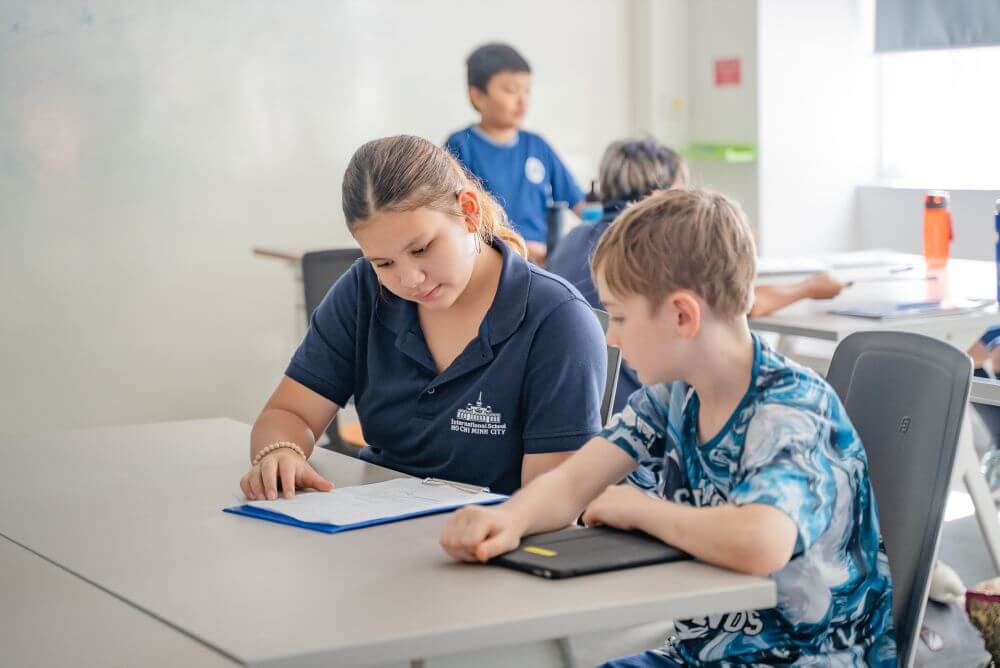
By engaging in hands-on exploration and problem-solving activities, students develop important skills such as creativity, collaboration, and independent thinking. This approach not only enhances academic performance but also nurtures a lifelong love for learning and discovery.
At ISHCMC, our IB Programme goal is to provide a positive and supportive academic environment for. We offer carefully planned programs and innovative teaching techniques that help students reach their full academic potential, whether they are preparing for higher education or their future careers.
Good Schools Can Help Your Child Improve Their Social Interaction Skills
In good schools, your child learns more than just facts and figures. They also learn important skills that help them get along with others and build strong relationships. These skills serve as invaluable tools that children utilize in various aspects of their lives. Here are some key areas where a quality education fosters the development of these skills
- Collaboration Skills
- Communication Skills
- Critical Thinking Skills
- Creative Thinking Skills
- Transferring Skills
- Research Skill
Let’s explore each of these areas in detail.
1. Collaboration Skills
Collaboration means working together as a team. In good schools, children often do projects with their classmates. This helps them learn how to share ideas, solve problems together, and be a good team player. Learning to collaborate teaches children how to cooperate with others and achieve common goals, which are essential for working well in groups and building friendships.
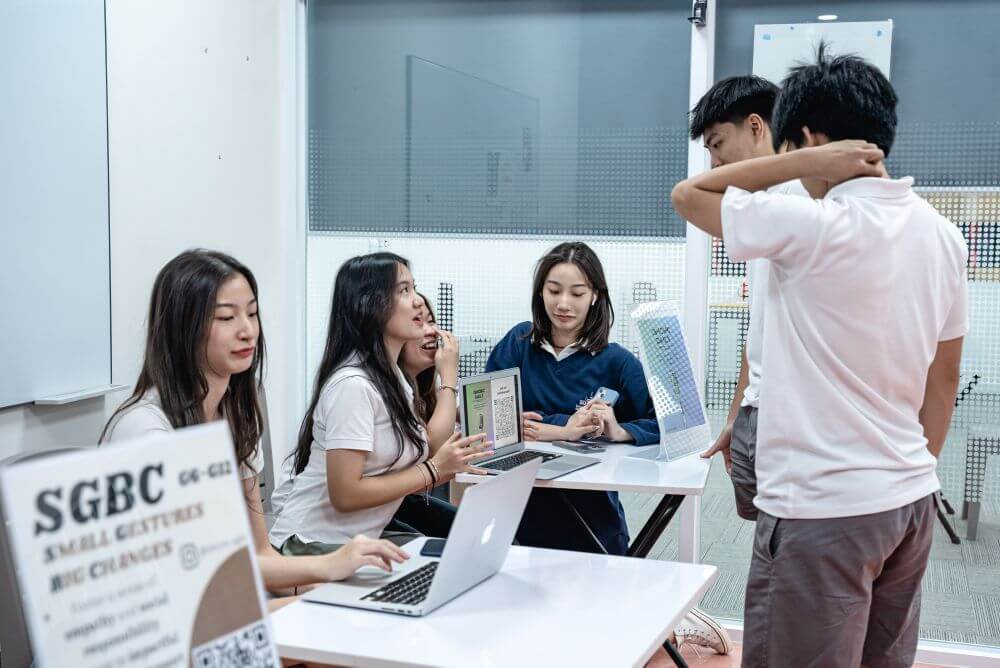
2. Communication Skills
Communication is how we talk and listen to others. Good schools teach children how to express themselves clearly and listen to others. This helps them communicate better with friends, teachers, and family members. By practicing communication skills, children learn to express their thoughts and feelings effectively, as well as understand the perspectives of others, leading to smoother interactions and fewer misunderstandings.
3. Critical Thinking Skills
Critical thinking means thinking carefully about things. In good schools, kids are encouraged to ask questions and think about different ideas. This helps them make smart choices and understand other people’s perspectives. By fostering critical thinking skills, schools empower children to analyze information, evaluate arguments, and enabling them to navigate social situations with confidence and discernment.
4. Creative Thinking Skills
This is about coming up with new ideas and solutions. Good schools encourage children to think outside the box and be creative, which fosters innovative solutions to challenges and helps them solve problems in unique ways.
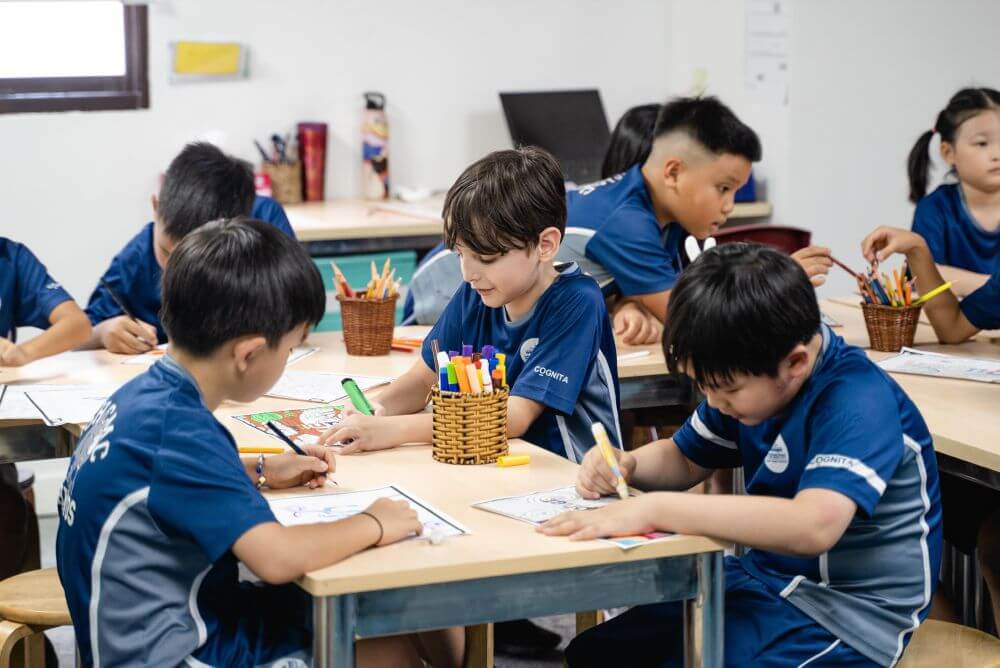
5. Transferring Skills
Transferring skills is about applying what you learn to various situations. In good schools, children learn to use their knowledge in new ways, helping them adjust to different social scenes and places.
It’s about teaching kids to see patterns and links between different situations, so they can use what they know in a wide range of social settings and challenges.
6. Research Skills (Media literacy and Information literacy)
Research skills help children find reliable information. Good schools teach kids how to search for information online and decide if it’s trustworthy.
This skill supports students in learning about the world and making smart choices. Learning how to research, understand media, and evaluate information gives children the ability to sort through lots of data, tell real facts from false ones, and think critically about what they see and read online.
7. Affective Skills (Empathy, Self-motivation, Self-esteem, etc.)
Good schools nurturing practical skills cultivate emotional intelligence and resilience, enabling children to empathize with others, stay motivated in the face of challenges, and develop a positive self-image, laying the foundation for healthy relationships and personal well-being.
8. Organizational Skills
In good schools, children learn how to plan their time, set goals, and keep track of their tasks. This helps them juggle schoolwork, activities, and friendships without feeling overwhelmed, while reducing stress in social and academic settings.
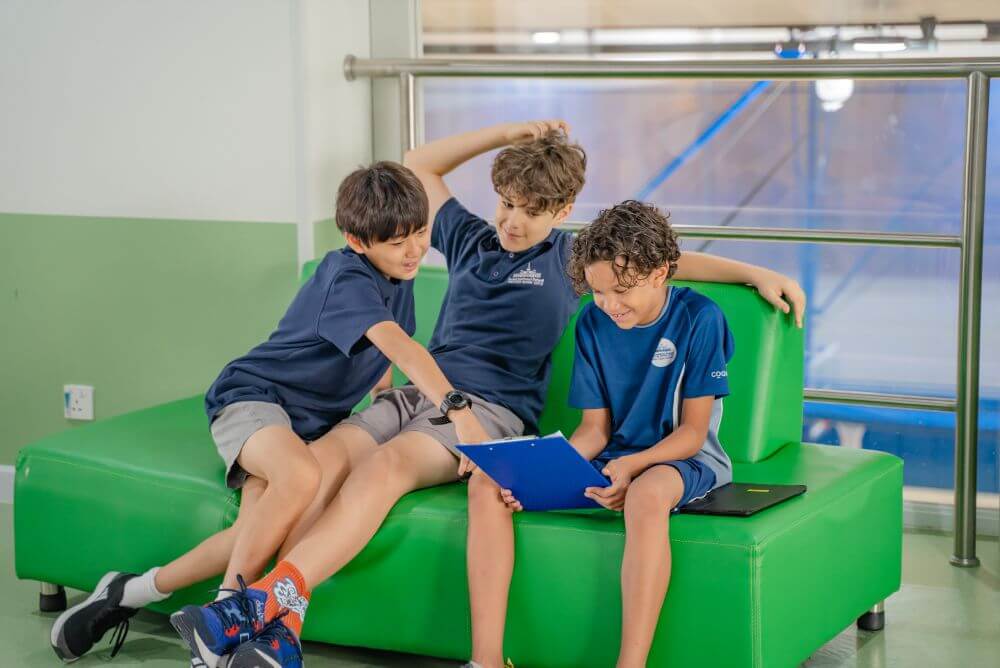
9. Reflective Skills
Good schools encourage kids to think about their actions and feelings, helping them understand themselves and learn from their mistakes. This approach boosts self-awareness and a growth mindset, allowing children to consider their actions, learn from both successes and failures and change their behavior when needed.
The ‘Approaches to Learning’ (ATL) skills are crucial in the IB Programme. Students develop these skills at ISHCMC, aligning with the Learner Profile traits and lifelong learning.
Good Schools Can Promote Physical Development Skills
In addition to academic growth, good schools also play a vital role in fostering physical development skills in children. These skills are crucial for overall health and well-being, and they lay the foundation for a lifetime of physical activity and fitness.
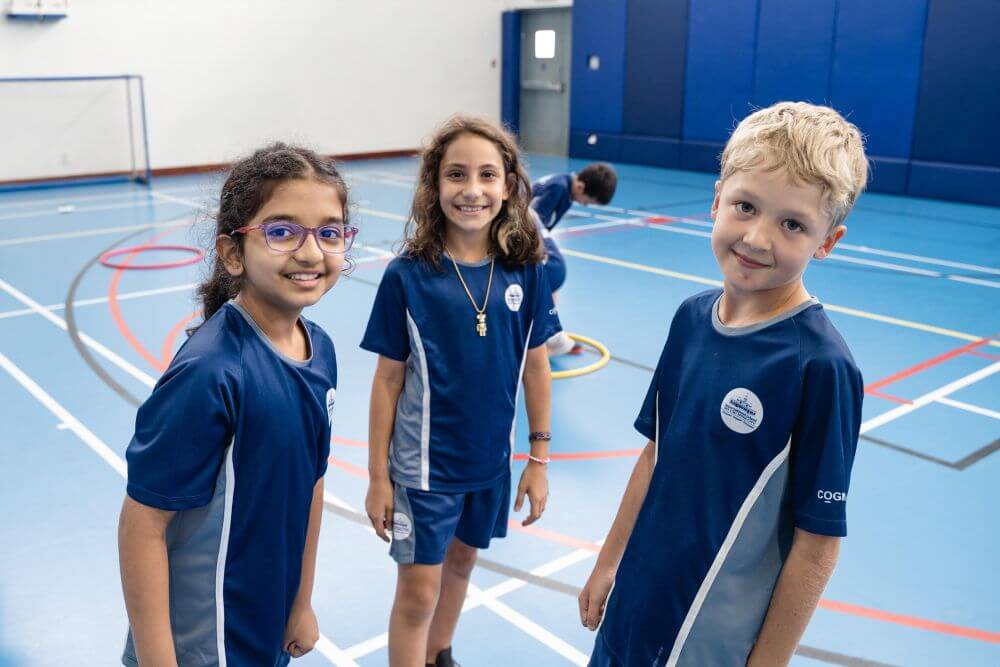
- Gross motor skills involve using big muscles for actions like running and jumping. Good schools give kids chances to play and do activities that improve these skills.
- Fine motor skills involve using small muscles for detailed actions like writing and cutting. Top schools offer activities that help kids improve at these tasks, making it easier for them to write and handle tiny objects.
- Coordination skills are needed for activities that require exact movements and timing, like catching a ball. Through sports and games, great schools help kids improve their coordination, understanding of space, and ability to move different parts of their bodies together smoothly.
- Balance and agility skills are important for activities like biking and climbing. Excellent schools provide ways for kids to practice staying steady, moving through obstacles quickly, and being nimble, which builds their confidence and skill in moving in different ways.
- Strength and endurance skills get better by doing things that make muscles work hard, like lifting or playing sports. Good schools have many physical activities and sports to make kids stronger and fitter.
- Spatial awareness is about knowing where your body is compared to things around you. Top schools use activities that require moving around obstacles and interacting with the space, which helps kids understand space and control their movements better.
- Eye-hand coordination is crucial for tasks that need careful hand movements and watching things closely, such as playing sports or video games. Famous schools have activities that improve this skill, helping kids match what they see with their movements.
- Posture refers to the alignment and positioning of the body while sitting, standing, or moving. Great schools emphasize good posture by providing the right chairs and activities that strengthen the muscles around your spine.
- Body awareness skills mean knowing about different parts of your body and what they do. Leading schools include activities that let kids learn about their bodies through moving, feeling, and expressing themselves, increasing their understanding of how their bodies work.
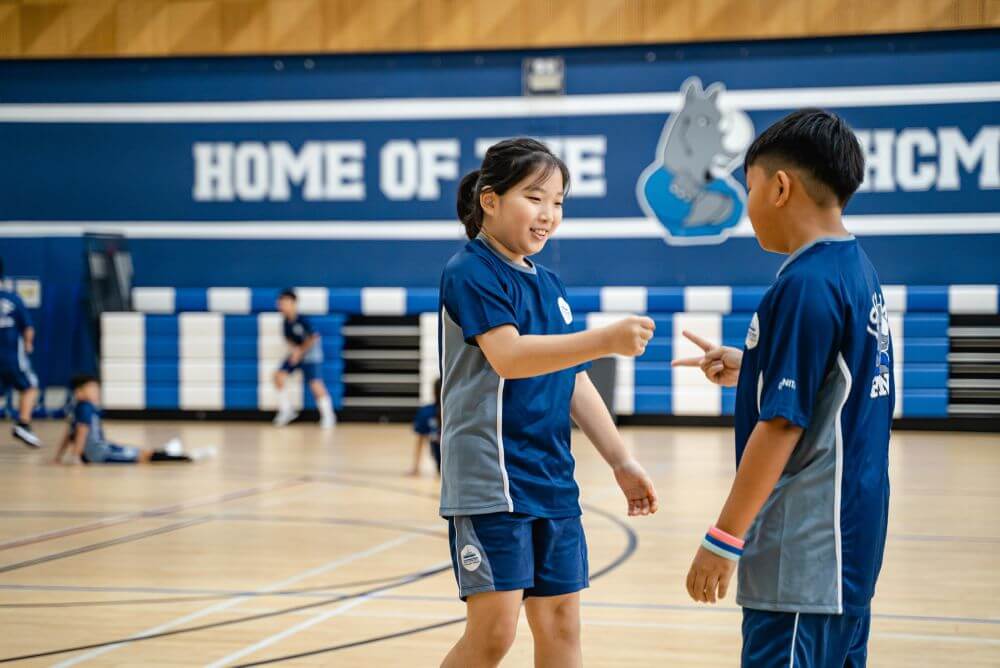
At ISHCMC, we firmly believe in nurturing well-rounded individuals. Our after-school programs provide students with the opportunity to engage in sports, foster physical development and impart essential life skills. We offer inter-school competitions across three age groups (U11, U14, and U19) in various sports like: Volleyball, football, basketball, badminton, gymnastics, track & field…
Wrapping Up!
In short, the question of “how does school affect students?” is answered. Good schools are crucial for kids to become their best selves.
ISHCMC understands the multifaceted impact of schooling on students’ lives. Our commitment to nurturing academic excellence, social development, and physical well-being underscores our dedication to holistic education.
By blending rigorous academics like the International Baccalaureate (IB) Programme with innovative methodologies such as inquiry-based learning, we strive to equip students with the knowledge, skills, and dispositions necessary for success in the 21st century.
FAQs
As parents and students explore educational options, it’s natural to have questions. Here are some common questions:
1. How Does the School Handle Issues Such as Bullying, Peer Pressure, and Student Conflicts?
Schools focus on creating a safe and welcoming environment where issues like bullying, peer pressure, and conflicts are addressed promptly. The approach typically involves open discussions, promoting understanding among students, and providing counseling services when necessary. The goal is to ensure every student feels heard, valued, and respected.
At ISHCMC, this commitment to a positive and inclusive school environment is a priority, with specific strategies in place to support all students effectively.
2. How Does the Curriculum Align with My Child’s Interests, Strengths, and Future Goals?
A well-designed curriculum offers flexibility, enabling students to pursue their interests and strengthen their abilities. Schools offer a range of specialized programs, extracurricular activities, and customized learning paths to ensure students can align their educational experiences with their interests, strengths, and future ambitions.
ISHCMC embodies this approach, providing a curriculum and support services that cater to individual student needs and help them prepare for their future successfully.

